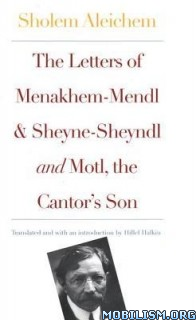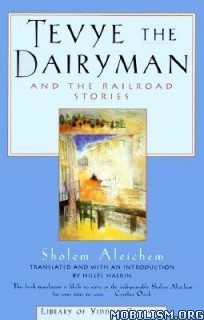3 Novels by Sholem Aleichem
Requirements: EPUB Reader, 4 MB
Overview: Jewish writer, Sholem Rabinovich (1859-1916), who wrote under the pen name of Sholem Aleichem (Hebrew for "peace be upon you"). From 1883 on, Sholem Aleichem produced over forty volumes in Yiddish, thereby becoming a central figure in Yiddish literature by 1890. Sholem Aleichem's narratives were notable for the naturalness of his characters' speech and the accuracy of his descriptions of shtetl life. Early critics focused on the cheerfulness of the characters, interpreted as a way of coping with adversity. Later critics saw a tragic side in his writing. He was often referred to as the "Jewish Mark Twain" because of the two authors' similar writing styles and use of pen names. Both authors wrote for both adults and children, and lectured extensively in Europe and the United States.
Genre: Jewish Literature / Classics / Humor



Stempenyu: A Jewish Romance (Translated by Hannah Berman)
The first work of Sholom Aleichem’s to be translated into English—this long out-of-print translation is the only one ever done under Aleichem’s personal supervision—Stempenyu is a prime example of the author’ s hallmark traits: his antic and often sardonic sense of humor, his whip-smart dialogue, his workaday mysticism, and his historic documentation of shtetl life.
Stempenyu is the hysterical story of a young village girl who falls for a wildly popular klezmer fiddler—a character based upon an actual Yiddish musician whose fame set off a kind of pop hysteria in the shtetl. Thus the story, in this contemporaneous “authorized” translation, is a wonderful introduction to Aleichem’s work as he wanted it read, not to mention to the unique palaver of a nineteenth-century Yiddish rock star.
Tevye the Dairyman and the Railroad Stories (Translated by Hillel Halkin)
Of all the characters in modern Jewish fiction, the most beloved is Tevye, the compassionate, irrepressible, Bible-quoting dairyman from Anatevka, who has been immortalized in the writings of Sholem Aleichem and in acclaimed and award-winning theatrical and film adaptations. Beautifully translated by Hillel Halkin, here is Sholem Aleichem’s heartwarming and poignant account of Tevye and his daughters, together with the “Railroad Stories,” twenty-one tales that examine human nature and modernity as they are perceived by men and women riding the trains from shtetl to shtetl.
The Letters of Menakhem-Mendl and Sheyne-Sheyndl and Motl, the Cantor's Son (Translated by Hillel Halkin)
The Letters of Menakhem-Mendl and Sheyne-Sheyndl portrays a tumultuous marriage through letters exchanged between the title character, an itinerant bumbler seeking his fortune in the cities of Russia before departing alone for the New World, and his scolding wife who becomes increasingly fearful, jealous, and mystified.
Motl, Peysi the Cantor's Son is the first-person narrative of a mischievous and keenly observant boy who emigrates with his family from Russia to America.
The final third of the story takes place in New York, making this Sholem Aleichem's only major work to be set in the United States. Motl and Menakhem-Mendl are in one sense opposites -- the one a clear-eyed child and the other a pathetically deluded adult. Yet both are ideal conveyors of the comic disparity of perception on which humor depends. If Motl sees more than do others around him, Menakhem-Mendl has an almost infinite capacity for seeing less. Sholem Aleichem endows each character with an individual comic voice to tell in his own way the story of the collapse of traditional Jewish life in modern industrial society as well as the journey to America, where a new chapter of Jewish history begins.
Download Instructions:
https://www.restfilee.com/bc7hpwnmz5vt
Last edit on 16 March, 2023
Requirements: EPUB Reader, 4 MB
Overview: Jewish writer, Sholem Rabinovich (1859-1916), who wrote under the pen name of Sholem Aleichem (Hebrew for "peace be upon you"). From 1883 on, Sholem Aleichem produced over forty volumes in Yiddish, thereby becoming a central figure in Yiddish literature by 1890. Sholem Aleichem's narratives were notable for the naturalness of his characters' speech and the accuracy of his descriptions of shtetl life. Early critics focused on the cheerfulness of the characters, interpreted as a way of coping with adversity. Later critics saw a tragic side in his writing. He was often referred to as the "Jewish Mark Twain" because of the two authors' similar writing styles and use of pen names. Both authors wrote for both adults and children, and lectured extensively in Europe and the United States.
Genre: Jewish Literature / Classics / Humor



Stempenyu: A Jewish Romance (Translated by Hannah Berman)
The first work of Sholom Aleichem’s to be translated into English—this long out-of-print translation is the only one ever done under Aleichem’s personal supervision—Stempenyu is a prime example of the author’ s hallmark traits: his antic and often sardonic sense of humor, his whip-smart dialogue, his workaday mysticism, and his historic documentation of shtetl life.
Stempenyu is the hysterical story of a young village girl who falls for a wildly popular klezmer fiddler—a character based upon an actual Yiddish musician whose fame set off a kind of pop hysteria in the shtetl. Thus the story, in this contemporaneous “authorized” translation, is a wonderful introduction to Aleichem’s work as he wanted it read, not to mention to the unique palaver of a nineteenth-century Yiddish rock star.
Tevye the Dairyman and the Railroad Stories (Translated by Hillel Halkin)
Of all the characters in modern Jewish fiction, the most beloved is Tevye, the compassionate, irrepressible, Bible-quoting dairyman from Anatevka, who has been immortalized in the writings of Sholem Aleichem and in acclaimed and award-winning theatrical and film adaptations. Beautifully translated by Hillel Halkin, here is Sholem Aleichem’s heartwarming and poignant account of Tevye and his daughters, together with the “Railroad Stories,” twenty-one tales that examine human nature and modernity as they are perceived by men and women riding the trains from shtetl to shtetl.
The Letters of Menakhem-Mendl and Sheyne-Sheyndl and Motl, the Cantor's Son (Translated by Hillel Halkin)
The Letters of Menakhem-Mendl and Sheyne-Sheyndl portrays a tumultuous marriage through letters exchanged between the title character, an itinerant bumbler seeking his fortune in the cities of Russia before departing alone for the New World, and his scolding wife who becomes increasingly fearful, jealous, and mystified.
Motl, Peysi the Cantor's Son is the first-person narrative of a mischievous and keenly observant boy who emigrates with his family from Russia to America.
The final third of the story takes place in New York, making this Sholem Aleichem's only major work to be set in the United States. Motl and Menakhem-Mendl are in one sense opposites -- the one a clear-eyed child and the other a pathetically deluded adult. Yet both are ideal conveyors of the comic disparity of perception on which humor depends. If Motl sees more than do others around him, Menakhem-Mendl has an almost infinite capacity for seeing less. Sholem Aleichem endows each character with an individual comic voice to tell in his own way the story of the collapse of traditional Jewish life in modern industrial society as well as the journey to America, where a new chapter of Jewish history begins.
Download Instructions:
https://www.restfilee.com/bc7hpwnmz5vt
Last edit on 16 March, 2023